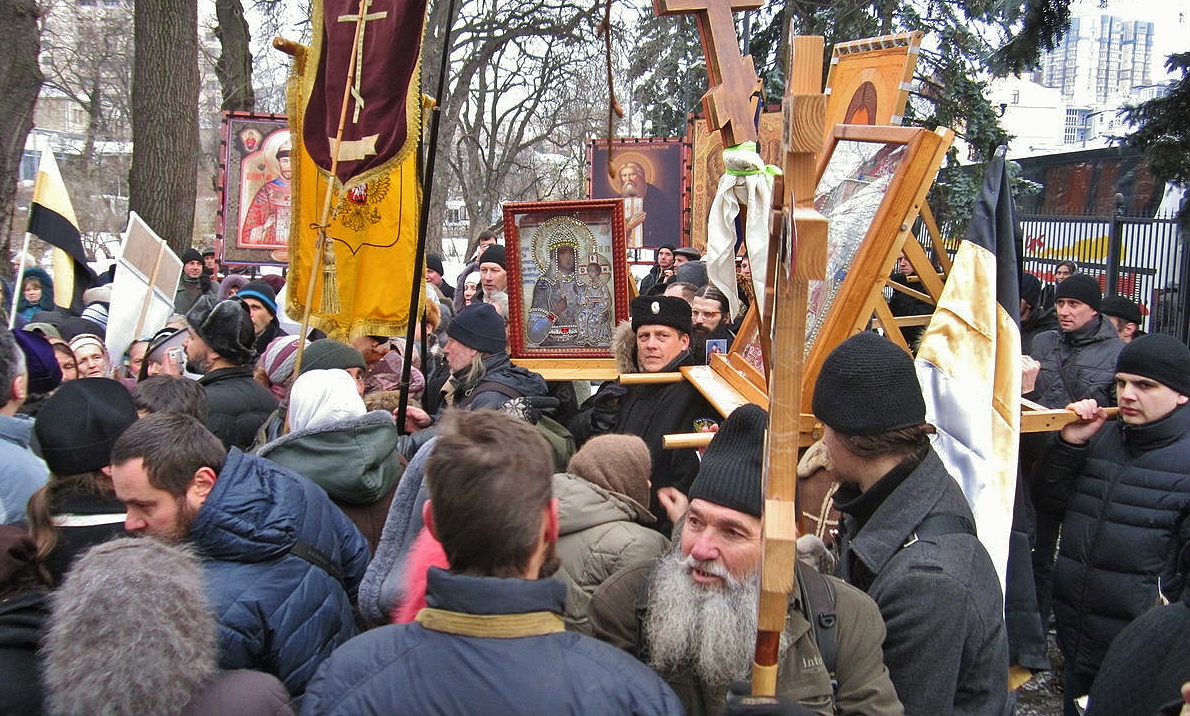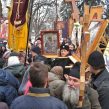
Russian Orthodox Activists—Value in Deniability for the Kremlin
Publication: Eurasia Daily Monitor Volume: 12 Issue: 39
By:

The Moscow Patriarchate’s subordination to the political will of the Kremlin has been evident for so long that it no longer attracts much attention. Patriarch Kirill and his entourage can generally be counted on to follow every twist and turn in the Kremlin line just as their predecessors did in Soviet times. But there is another aspect of Russian Orthodoxy that has received less attention, although it may be playing an equally important part in President Vladimir Putin’s propaganda offensive: the role of self-proclaimed “Russian Orthodox activists.”
These Orthodox “activists” are regularly used to promote Kremlin ideas or even suggest more radical ones to test the waters with regard to Russian foreign policy—and Moscow can deny their activities, if problems emerge. Furthermore, the Orthodox activists can provide many of the foot soldiers of Kremlin-organized groups like the Anti-Maidan (see EDM, February 24), thus tying the Church itself even more closely to Putin’s agenda than, at least some, of its top leaders and many of its parishioners would be inclined to do. Evidence of both of these uses of Russian Orthodox “activists” were very much on display over the last week.
The role of such activists in foreign affairs was highlighted by their alleged concerns that the Ecumenical Patriarchate of Constantinople is working to promote a single Ukrainian Orthodox Church separate from the Moscow Patriarchate—just as it did earlier in Estonia and in the Czech Republic. They argue that the Ecumenical Patriarchate is acting as an agent of the United States because, by promoting such separations, this Church is weakening Moscow and thus helping the West (Ruskline.ru, February 25).
The Moscow Patriarchate itself has made no secret of its concerns about the role of the Ecumenical Patriarchate, but its comments have been restrained, most likely because it does not want a break with the Church to which all Orthodox look. Consequently, churchmen in Moscow have not denounced it in such terms or suggested that the Patriarchate in Constantinople is nothing more than a catspaw for American “imperialism.”
But Russian Orthodox activists feel no such constraints. The editors of the “Russkaya Narodnaya Liniya” site, one of the chief outlets of this group, are quite prepared to go on the attack. In commenting on these developments, they assert it would have been possible to find “a compromise between Istanbul [Constantinople] and Moscow,” if only the Churches were involved. Unfortunately, they add, what is going on is about far more than religion, and the Russkaya Narodnaya Liniya editors insist that “it is not excluded that one must find here ‘an American trace’ ” (Ruskline.ru, February 25).
And the editors declare that, “as is well-known, the Constantinople Patriarchate is very dependent on the US administration” not only because the majority of its parishes are in the United States, but because the current Patriarch (Bartholomew) is newly arrived from church positions there and routinely refers to the Americans as “our partners over the ocean.” Therefore, “Russkaya Narodnaya Liniya” insists, Constantinople’s current activities are “part of American sanctions against Russia.”
If anyone in Constantinople or elsewhere complains, the Moscow Patriarchate and the Russian government can play innocent and deny any role in spreading this idea. But the Russian Orthodox activists are serving Moscow’s interests in any case.
A more immediate threat comes as a result of recruiting Orthodox activists into the Anti-Maidan groups in Russia. East European Studies researcher Nikolay Mitrokhin argues that these activists provide both some of the leaders and a large share of the followers of the Anti-Maidan organizations, and they have greater ties to the police than they do to the Russian Orthodox Church. In a discussion of this trend, the longtime specialist on nationalist and religious movements notes that Moscow can only find a few prominent figures for these groups and thus has had to turn to less obvious places for the foot soldiers, including “among hysterical Orthodox activists” (Grani.ru, February 26).
Some of these are former priests, some of them had ties to the Moscow Patriarchate in the past and even enjoyed its protection, and some are ordinary Russians who have been swept up in the nationalist wave in recent months. But all of them present themselves not as nationalists but as Orthodox activists. This distinction allows the regime to suggest that the Anti-Maidan movement has deeper roots than is, in fact, the case. Moreover, it distracts attention from the fact that this group, like others, is the latest example of a government-organized repressive group that the Kremlin can and will disown if things spiral out of control.
The Russian government acted in precisely this manner at the end of tsarist times, and it is quite capable of doing so again. As a result, following those who call themselves “Russian Orthodox activists” is now one of the most important tasks for anyone wishing to understand what Putin and his regime will do next.




